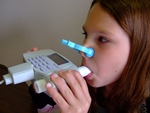Diagnosis
An accurate diagnosis is an important first step in managing asthma and only a healthcare provider can diagnose asthma. If you think you may have symptoms of asthma, ask your healthcare provider about next steps.
An asthma diagnosis is generally made using a medical history, a physical examination, and breathing tests.
Medical History
A medical history will likely include questions about your past and current health related to asthma. You may be asked questions about common asthma symptoms and when you have them, questions about your personal and family health history, and questions about the environment you live in (including work and school).
Some example questions might be:
- Do you have a cough? Are you short of breath? Is your chest feeling tight? Do you wheeze?
- When do you have these symptoms? During the day? At night time? With exercise or activity?
- Do you or family members have allergies?
Physical Examination
Your healthcare provider may check for signs that you may have asthma. This might include:
- Listening to your chest for sounds that may be heard in those with asthma.
- Looking at your eyes and nose for signs of allergies, e.g., dennie-morgan lines (extra folds under the eyes), the appearance of “shiners”, or the appearance of a nasal crease (line across the lower part of the bridge of the nose from repeated wiping or rubbing of the nose).
- Looking at your skin for signs of eczema, dermatitis, and hives.
Breathing Tests

Breathing tests are the most reliable way to diagnose asthma and the most preferred breathing test is one called spirometry. Spirometry is a simple breathing test that measures the speed and the amount of air you are able to blow out of your lungs.
To learn more about breathing tests and to watch a video demonstration on spirometry visit Breathing Tests.
Other breathing tests that can be used to diagnose asthma are peak expiratory flow (PEF) and challenge tests. The measurement of PEF (sometimes called - peak flow) involves taking in as deep a breath as possible and blowing out as hard and as fast as possible into the measuring device called a peak flow meter. Peak flow measurement is the simplest test to measure airflow limitation, however, because it has many limitations it is not the preferred breathing test used to diagnose asthma. Peak flow is often used to help monitor asthma symptoms.
To learn more about how to use a peak flow meter watch the following video – How to Use a Peak Flow Meter.
Challenge tests are used when spirometry results are normal and asthma is still suspected. Challenge tests involve trying to induce bronchospasm (tightening of the muscles around the airways) by inhaling a chemical called methacholine or by exercising, and measuring lung function (spirometry). These tests are most often performed in a specialized center where strict protocols are followed, and emergency care is available.
Other tests your healthcare provider might recommend are:
- Allergy testing
- Chest x-rays
- Blood test
- Sputum (phlegm or mucus) test
Asthma Severity
Asthma severity is determined based on how much medication is needed to gain asthma control.
Mild-to-Moderate Asthma
Asthma that is well-controlled on as needed reliever therapy (short-acting bronchodilator or budesonide/formoterol) or low to moderate doses of controller therapy (inhaled corticosteroids) is asthma that is considered mild-to-moderate.
Severe Asthma
Severe asthma typically refers to asthma needing high doses of controller therapy (inhaled corticosteroids), or needing oral corticosteroids in order to remain well-controlled or asthma that is uncontrolled despite these therapies.
People with severe asthma may be on additional therapies (medications), often called ‘add-on’ therapies. These add-on therapies include additional controller medications. Add on therapies include;
- leukotriene receptor agonists – LTRAs,
- biologics,
- oral corticosteroids (prednisone),
- and macrolides (antibiotic).
For more information on severe asthma, visit the severe asthma page.
Asthma Control
 |
“Empowering children to understand their disease and to know how to take control of it, is one of the best things parents can do for their children with asthma.” – Lori, mom of two daughters living well with asthma |
Almost all asthma can be well-controlled! When asthma is well-controlled you can do more, feel better, and maybe even use less medication.
To find out if your asthma is well-controlled, take the following simple test.





